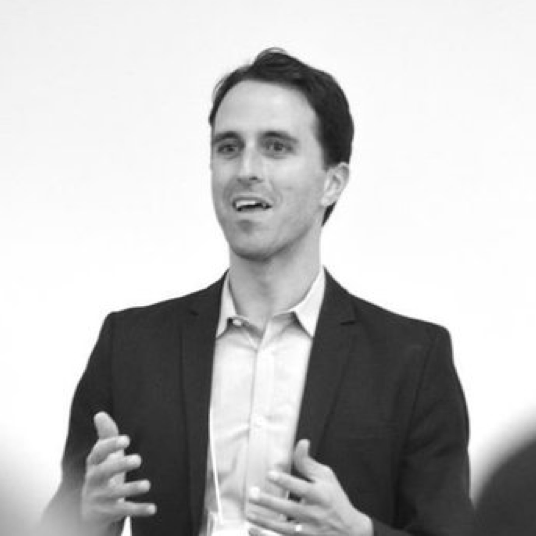
Chris Fabian,
Co-Founder, ResourceX

June 1, 2018
At Horizons, JFF’s national summit in New Orleans, June 13–14, JFFLabs is hosting eight sessions. Below you’ll find details on each. For more information on Horizons sessions and speakers visit horizons.jff.org.
In the midst of tremendous technological change and an evolving labor market, what can cities do to help residents and businesses prepare for the future of work? The operating model of city and county government is due for a refresh to contend with the workforce challenges facing cities today, from escalating competition to attracting employers to a workforce that may lack the skills for new and evolving occupations. In this session, leaders who are reimagining the role of local government will explore bold ideas for how cities can ensure equity and opportunity for secure work in an era of accelerating change.

Co-Founder, ResourceX

Clinical Assistant Professor of Public Service, NYU

Toledo City Council

Executive Vice President of e.Republic

As lines between education and work blur, investors are maneuvering the landscape of all stakeholders, attempting to sift through programmatic noise, identifying promising practices, ensuring the alignment between business needs and the needs of those directly served. They do this while also looking to generate measurable societal good. This panel, facilitated by JFFLabs, will explore how investors are thinking about incentives, where and how private dollars can/should be used to augment public investments, and discuss what innovative approaches they are seeing within the ecosystems of philanthropy, nonprofits, academia and industry.

JFFLabs and Senior Advisor to JFF

Principal, Investments, Omidyar Network

Managing Partner, ReThink Education

Co-Founder and General Partner, New Markets Venture Partners

Founding Partner, Tyton Partners
Gaps between people and work persist. Work and career are usually found through personal and professional connections – but what if you have a small or nonexistent network? Lack of soft skills is a perennial hurdle to developing talent pipelines – but what if many individuals have no formal or informal way to acquire those skills? Successful careers develop when individuals connect their unique talents with a field of expertise – but what if most individuals have no opportunity to develop that knowledge or receive any guidance? A long-standing approach to addressing these gaps – network, employability, career awareness – has been through work-based learning (WBL). Often WBL is administered very well at a programmatic level serving 25-30 individuals, but examples of scaling WBL are not common. The Foundation for California Community Colleges has partnered with JFF to work with 30 Community Colleges to explore how 1) effective planning and 2) practitioner-informed tools can support the scaling of work-based learning. The initiative, supported by the California Community Colleges Chancellors Office, has utilized some of the lessons from JFF’s K-12 work-based learning system research to inform the planning process. Participating colleges implement their plan with the Career Experience Suite, a group of three tools that support WBL at scale: Here to Career Mobile App, Career Experience Portal WBL Management Platform, and Career Catalyst Employer-of-Record Service. Come join us to discuss this topic and share how you scale WBL.

Director of Workforce Development, Foundation for California Community Colleges

Senior Program Manager

President and Chief Executive Officer, Foundation for California Community Colleges

Director of Learning Science, Chan Zuckerberg Initiative
This session will feature founders and CEOs of innovative startups that are accelerating changes across postsecondary, talent pipelines, and workforce management. We will look at their work, strategies, lessons learned, and measures of success and see what lessons we can draw from them to inform and influence the future behaviors of traditional systems as they also evolve to meet the changing needs of our economy.

CEO & Co-Founder, SVAcademy

Co-Founder and CEO, Skillist

Founder & CEO, ReUp Education
Too often, people who need the most help finding work are stuck using antiquated tools and methods to get there. This session is all about designing and implementing a workforce system where job seekers and employers are equipped with the best possible tools to achieve their goals. Presenters will share stories about how new technologies are improving the efficiency and efficacy of workforce programs and job centers, while sharing the areas where technology alone cannot solve the problem. They’ll discuss how the workforce system can anticipate and act proactively given the changes in the economy and world of work. You’ll leave with a better understanding of the challenges faced by the workforce systems and ideas you can take home and put into action tomorrow, next month, and next year.

Manager, Economic Graph, LinkedIn

Founder and CEO, BrightHive

Senior Program Manager for Workforce Development and Criminal Justice, Code for America

Director, JFF
The Employment Technology Fund (ETF) is a collaboration between five leading foundations to invest in high impact, scalable technology solutions that can help the over 100 million Americans who struggle to find meaningful employment in the U.S. The technologies span several workforce market categories, including learning and training, mentoring and support, assessment and matching, and job search and placement. In this session, ETF representatives will share examples of emerging technologies that help individuals find a path to employment and improve their earnings potential, careers, and livelihood. They will also share innovative program models from across the United States for effectively incorporating new technologies, including mobile learning, tech-enabled assessments, virtual mentoring, big data, and AI, to increase the reach and impact of education and workforce programs. The EdTech Center @ World Education will report on emerging best practices from ongoing field testing of ETF-funded tools at workplaces, libraries, community-based organizations, and other environments. Participants will walk away with an overview as well as specific current examples of the power of new technologies to help train, support, and increase economic mobility for low-income, low-skilled adults in the United States.

Founder & CEO, Camelback Ventures

Director of Strategic Initiatives, EdTech Center @ World Education
As we’ve celebrated the innovation gains of the new economy and marveled at the creation of disruptive technologies, many of our traditional economic and social systems have been upended by the external forces of technological advancement and are now stressed to integrate new technology into their internal operations, service delivery, and regional strategies.
In this session, we’ll consider what a more deliberate and disciplined approach might look like for tapping the power and potential of traditional workforce development systems. How might these systems better adapt to market fluctuations and team with new economy players to do so? How might we better leverage data to drive decision making and inform the design of public-private solutions to our shared challenges?

Assistant Executive Director and Workforce Technology Director, National Association of State Workforce Agencies

CEO, National Association of Workforce Boards

General Partner, New Markets Venture Partners

Vice President of Strategy, San Diego Workforce Partnership

Entrepreneur in Residence, JFFLabs
Through lightning talks and a panel discussion, this session will spotlight innovative solutions designed to bridge systems of education and system of work. Society is at an inflection point when many sectors are merging—postsecondary education, workforce development, and adult learning—driving the need for unconventional, cross-sector collaborations around how people are hired, trained, and upskilled over time. This convergence creates massive opportunity to form and scale new solutions, and for those solutions to have a more holistic impact on a future in which all people can achieve dignified work.

President, Entangled Studios

Director, Skillful Colorado

CEO and Co-Founder, Entangled Group

Founder and Chief Executive Officer, Cell-Ed